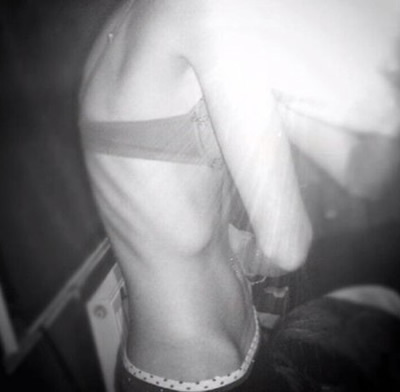Characteristics of Anorexia
Psychology / / July 04, 2021
Anorexia is a nutritional disease that can be of physical or mental origin, generally this disease affects the women and is related to physical appearance and dissatisfaction with it, is closely linked to bulimia and can be consider close to vigorexia, as all these diseases distort the appearance of individuals and are very difficult to control.
Anorexia is a term that derives from the Greek and means "no appetite", and the anorexia is characterized In that the causes can be very diverse, from physical origins such as pellagra, infections, amoebas or other conditions that do not allow the full absorption of nutrients, and anorexisa nervous or mental, which mainly affects adolescent girls (although lately it has been seen in younger girls, adult women and even men and women). kids).
Characteristics of anorexia:

Addiction.- Sometimes anorexia and bulimia occur in people who usually ingest drugs that alter their sensation and reality thus removing the feeling of hunger and reducing the suffering caused by lack of food.
Auto diets.- People with eating problems, diets are established, in which they remove one or more foods, and are usually vegetarians anorexics, mainly due to the fact that little crushed vegetables do not provide food to the body and are discarded entirely.
Control.- Anorexic people, as well as vigorexics, get an exact control of their weight, diet and even their bowel movements. His regime reaches a perfection of an executive nature if not superior, by keeping a detailed record of each situation that is of interest to him.
Depression.- Depression is a primary effect produced by the apparent non-acceptance that society feels towards them, both because of their appearance, which in their eyes is fat, as well as the rejection or pressure produced so that they feed adequately.
Dehydration.- The body loses certain capacities to accept food and fluids, especially due to its low weight, which produces great physical damage and comes to thicken the blood fluid in the veins and arteries, producing embolisms and arrests cardiorespiratory.
Costume.- They are arranged in such a way that they hide their weight deficiency for a long time, they usually use very long and wide, which can help you secure the food in your bags, which you throw away when no one notices.
Hurt.- Damage is often inflicted as a means of persuading or punishing for mistakes in their regimen or as an escape from their anxiety.
Excessive exercise.- They tend to have very high sports regimes, especially in the use of static devices and exercise such as treadmills, bicycles, etc.
Sterility.- This occurs mainly in women when their malnutrition is such that they lose their menstrual cycle and their sterility can become permanent.
Lie.- It is the weapon most used by this type of patient, who tries to deceive his relatives, reaches a very high level in his lies, widely developing his mendacity.
Loneliness.- It is a self-inflicted effect that anorexia sufferers usually have, especially when they are rejected by those around them.
Threw up.- This is one of the techniques of expulsion of the food that they use, this can seriously damage the esophagus and teeth, sometimes producing esophageal cancer, due to the large amounts of acid expelled and its respective loss of mucosa esophageal.
Imitation.- Anorexia is very close to the figures and models that are presented on television, magazines and the Internet as stereotypes of beauty and acceptance.
Brain decline.- The brain decline is mainly produced by the deficiency of fluids and food, which causes the body takes reserves from the places it considers least necessary and directly affects the reasoning of the sick.
Death.- It is the unfortunate end that occurs when they are not cared for, both by family and friends, who should channel them to the corresponding professionals.
Treatment.- It is the process in which it helps you regain the confidence to feed yourself and the confidence for life. In general, it is a long and tedious process that is usually very drastic and heavy for the patient and their families.


